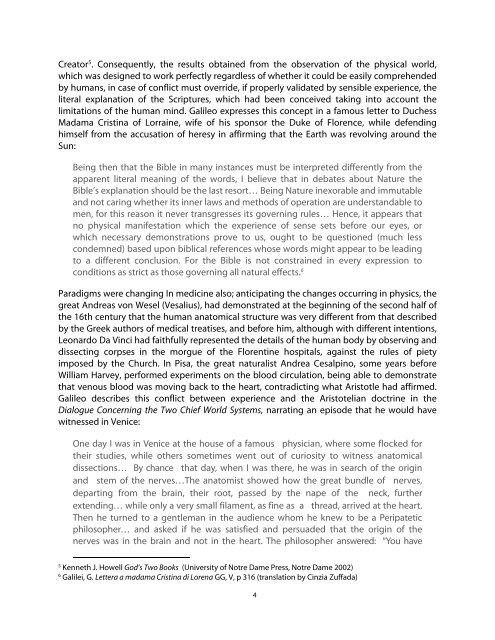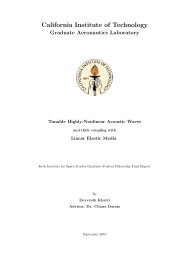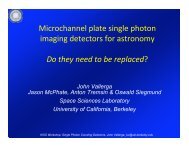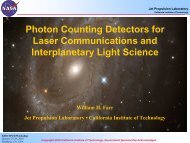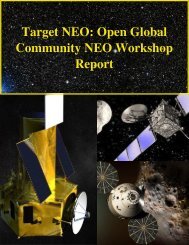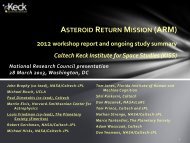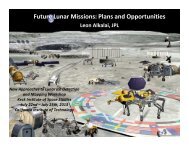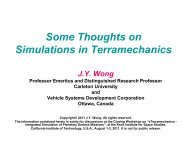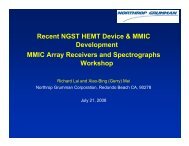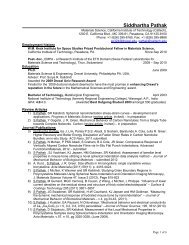The Legacy of Galileo - Keck Institute for Space Studies - Caltech
The Legacy of Galileo - Keck Institute for Space Studies - Caltech
The Legacy of Galileo - Keck Institute for Space Studies - Caltech
You also want an ePaper? Increase the reach of your titles
YUMPU automatically turns print PDFs into web optimized ePapers that Google loves.
Creator 5 . Consequently, the results obtained from the observation <strong>of</strong> the physical world,<br />
which was designed to work perfectly regardless <strong>of</strong> whether it could be easily comprehended<br />
by humans, in case <strong>of</strong> conflict must override, if properly validated by sensible experience, the<br />
literal explanation <strong>of</strong> the Scriptures, which had been conceived taking into account the<br />
limitations <strong>of</strong> the human mind. <strong>Galileo</strong> expresses this concept in a famous letter to Duchess<br />
Madama Cristina <strong>of</strong> Lorraine, wife <strong>of</strong> his sponsor the Duke <strong>of</strong> Florence, while defending<br />
himself from the accusation <strong>of</strong> heresy in affirming that the Earth was revolving around the<br />
Sun:<br />
Being then that the Bible in many instances must be interpreted differently from the<br />
apparent literal meaning <strong>of</strong> the words, I believe that in debates about Nature the<br />
Bible’s explanation should be the last resort… Being Nature inexorable and immutable<br />
and not caring whether its inner laws and methods <strong>of</strong> operation are understandable to<br />
men, <strong>for</strong> this reason it never transgresses its governing rules… Hence, it appears that<br />
no physical manifestation which the experience <strong>of</strong> sense sets be<strong>for</strong>e our eyes, or<br />
which necessary demonstrations prove to us, ought to be questioned (much less<br />
condemned) based upon biblical references whose words might appear to be leading<br />
to a different conclusion. For the Bible is not constrained in every expression to<br />
conditions as strict as those governing all natural effects. 6<br />
Paradigms were changing In medicine also; anticipating the changes occurring in physics, the<br />
great Andreas von Wesel (Vesalius), had demonstrated at the beginning <strong>of</strong> the second half <strong>of</strong><br />
the 16th century that the human anatomical structure was very different from that described<br />
by the Greek authors <strong>of</strong> medical treatises, and be<strong>for</strong>e him, although with different intentions,<br />
Leonardo Da Vinci had faithfully represented the details <strong>of</strong> the human body by observing and<br />
dissecting corpses in the morgue <strong>of</strong> the Florentine hospitals, against the rules <strong>of</strong> piety<br />
imposed by the Church. In Pisa, the great naturalist Andrea Cesalpino, some years be<strong>for</strong>e<br />
William Harvey, per<strong>for</strong>med experiments on the blood circulation, being able to demonstrate<br />
that venous blood was moving back to the heart, contradicting what Aristotle had affirmed.<br />
<strong>Galileo</strong> describes this conflict between experience and the Aristotelian doctrine in the<br />
Dialogue Concerning the Two Chief World Systems, narrating an episode that he would have<br />
witnessed in Venice:<br />
One day I was in Venice at the house <strong>of</strong> a famous physician, where some flocked <strong>for</strong><br />
their studies, while others sometimes went out <strong>of</strong> curiosity to witness anatomical<br />
dissections… By chance that day, when I was there, he was in search <strong>of</strong> the origin<br />
and stem <strong>of</strong> the nerves…<strong>The</strong> anatomist showed how the great bundle <strong>of</strong> nerves,<br />
departing from the brain, their root, passed by the nape <strong>of</strong> the neck, further<br />
extending… while only a very small filament, as fine as a thread, arrived at the heart.<br />
<strong>The</strong>n he turned to a gentleman in the audience whom he knew to be a Peripatetic<br />
philosopher… and asked if he was satisfied and persuaded that the origin <strong>of</strong> the<br />
nerves was in the brain and not in the heart. <strong>The</strong> philosopher answered: “You have<br />
5<br />
Kenneth J. Howell God’s Two Books (University <strong>of</strong> Notre Dame Press, Notre Dame 2002)<br />
6<br />
Galilei, G. Lettera a madama Cristina di Lorena GG, V, p 316 (translation by Cinzia Zuffada)<br />
4


